An MTK Adaptation Case Study from East Delhi
- Matija Mitak

- Mar 7, 2023
- 6 min read
Updated: Mar 23, 2023
TIGR2ESS-FP6: The Mobile Teaching Kitchen (MTK) in India Series
March 2023
‘Poshan Rasoi’: A collaboration between Vertiver and NNEdPro to link nutrition with behaviour change in Delhi
Authors: Harmanpreet, Chhaya Bhanti, Dolly Garia, Anamika Ghosh, Tanya Jaswal, Aakriti Wanchoo
Editors/Reviewers: Sumantra (Shumone) Ray, Sarah Armes, Wanja Nyaga, Sucheta Mitra, Ramya Rajaram
Acknowledgements: We would like to acknowledge and thank key individuals, particularly Indu Tripathi, Vasundhra Singh, Nikita Sharma, Deepshree Singh, Asim Manna, Debashis Chakraborty, Elizabeth Richards, Mousumi Naiya, Kanika Mondal; Organisations: Vertiver, NNEdPro, and Bhavishya Shakti and funding (from Vertiver) for their time and resources towards this project.
About Poshan Rasoi
Mobile Teaching Kitchen (MTK) Project has been a great achievement, with its final phase of micro-enterprise running successfully since 2019 in Kolkata. Inspired by the success, Vertiver Agency, a design and communications agency, and implementation partner for TIGR2ESS (Transforming India's Green Revolution by Research and Empowerment for Sustainable food Supplies) Project, which was wrapped up in March this year, put forward a plan for piloting of MTK in Delhi as they had strong community ties in East Delhi area.

The programme was a week-long endeavour that culminated in a two-day workshop, titled ‘Poshan Rasoi’, held on the 28th and 29th of March, 2022 at Durga Mandir Community Hall, Shahdara, New Delhi. It sensitized community women in East Delhi to the benefits of consuming nutritious food.
The programme engaged community women galvanized under Vertiver’s Su-Dhara programme, a community-centred multi-pronged behaviour change framework encompassing novel waste-to-wealth pilots and technological interventions that promote sustainable solid waste management practices.
One such pilot tested under Su-Dhara involved introducing a Biogas plant that would be used to power a newly set up and locally-based community kitchen and simultaneously cater to the community’s organic waste. Both, the kitchen and the plant, would be operated by the community women who come from economically weaker sections and subsequently empower them to become microentrepreneurs.
Putting two and two together, the scope of the project expanded, later on, to build on the waste-to-wealth pilot by including a component on the capacity development of these community women to produce and provide healthy and nutritious snacks in the community. Here NNEdPro’s role comes into existence.
While the waste-to-wealth pilot suffered some technical difficulties and had to be discontinued, it was noted that the programme garnered significant interest from the community women, serving as an appetizer that could feed into a larger vision of empowering community women from marginalized societies to become either microentrepreneurs or trainers or both. Furthermore, it paved the way for the conceptualization of another pilot which involved training community women to become nutritional educators.
The programme kick-started with a baseline assessment to understand the present nutrition and health status of the participating community women. Datasets collected included anthropometric data (wherein body, height and weight measurements were recorded), clinical assessments (wherein the presence of any diseases caused due to malnutrition such as goitre, oedema, and stomatitis was recorded), and demographic information. In addition, a Knowledge, Attitude, and Practices (KAP) survey and dietary recall of the participants were also conducted.
Images showing Team Vertiver collecting primary data from the participating community women
After the baseline study, the partners conducted the ‘Poshan Rasoi’ workshop, which was designed to raise nutritional awareness among community women who possessed a peripheral understanding of unhealthy street foods and expressed keenness on further developing their skills to promote nutritious food consumption. The workshop was based on the concept of “SODOTO” (“See One”, “Do One”, “Teach One”) formulated as part of the Mobile Teaching Kitchen (MTK) model by NNEdPro. The concept involves delivering comprehensive nutrition education and hygiene workshops via cooking demonstrations while leveraging a pre-set template menu comprising locally sourced ingredients.
The following activities were undertaken during the 2-day workshop in the following chronological order:
DAY1: “See One”
On the first day of the workshop, an orientation session was held to bring the community women up to speed on the nutritional kitchen, the benefits of consuming nutritional food, and how a regularized nutritional diet can prevent a plethora of diseases. In the ‘See One’ session, the community women observed the preparation of nutritionally balanced and affordable meals, as demonstrated by the trainers from NNEdPro.
Images showing community women interacting with the nutritional educators and NNEdPro experts at the “See One” session
DAY 2: ‘Do One, Teach One”
In the next session, ‘Do One’, the community women prepared and cooked nutritious dishes themselves. These included Chikki (peanut-based sweet), Spinach cutlet, Mixed vegetable sabji, and Vegetable Pancakes. In the final session, ‘Teach One’, the trained community women prepared 10 individual dishes which were enjoyed by all.
Images showing delicious and nutritious recipes cooked by the participating community women during the “Do One” session
Through the programme, a group of 10 women was mobilized and educated on basic nutrition concepts. They were further taught how to prepare low-cost healthy snacks and food including Champion Thali, a specially curated platter comprising 5-6 nutritional food items. After the workshop, the participating community women received a detailed cookbook with a selection of nutritious recipes that they could easily follow. During September, participation certificates were handed to the participants in Delhi and strategic and digital material support for the school programme was provided by the NNEdPro India team.
Post-programme developments
Building on the success of this programme, a range of nutrition-related activities has been carried out either solely by the community women or in collaboration with Team Vertiver and NNEdPro. For instance, some Community women held an in-person rally at a local park to extend their learnings on nutrition and build “nutrition dialogues'' within their community. During the event, the community women communicated nutritional facts on millets, oils and salts, etc., and prepared and shared nutritional dishes as tasters. Seeing the interest among the community women in learning more about healthy cooking habits and nutritious facts, nutrition-related infographics were designed and disseminated with the women through Su-Dhara’s active digital channels including Whatsapp and Facebook.

Image of trained community women facilitating a nutrition-based training workshop with their local community members
For instance, during Navratri, while being cognizant of food items generally avoided, recipes of three nutritious thalis and their associated nutritional values were circulated among the community women.
Sample images of digital content such as nutritional values of the Navratri Thali and salt-related facts, respectively, floated across digital channels connected with the community women
To sum it up, through the Poshan Rasoi programme and subsequent interactions with the community women, the appetite of community women for carrying forward nutrition-related work was gauged. This has been pivotal in drawing up a larger vision that entails empowering community women from marginalized societies to become either nutritional microentrepreneurs or trainers or both. To realize this vision, a micro pilot, titled ‘Bal Poshan Jagrukta’, was conceptualized and thereafter, successfully implemented at a primary government school in Delhi on December 15th, 2022.
The Su-Dhara Swachhata Doots, in collaboration with Team Vertiver and Team NNEdPro, steered an interactive workshop for primary government school students and teachers on the importance of consuming nutritious food.
The primary goal of the workshop was to bring science-based nutrition education to young children from financially weaker sections, through a creative mix of engaging and informative activities. The process leading to the workshop including its implementation was deeply collaborative, involving multiple stakeholders including the government, schoolteachers, nutritional experts, behaviour change agents, and on-ground implementers.
To onboard a school for the implementation of the workshop, Team Vertiver procured permission from the Director and Additional Director of Education, at the Municipal Corporation of Delhi. During the workshop, a range of activities was undertaken including nutrition-themed poem recitals, storytelling, quizzes, photo sessions with the Poshan Mascot, and more.
We were graced by over 90 pairs of eager eyes who chipped in, boisterously, to express what they knew about nutrition while expressing the same eagerness to learn more.
Given that the subject of discussion was definitely a drool-worthy one, the Su-Dhara Doots also prepared home-cooked chikkis, which were shared along with other goodies such as locally-available chestnuts, millets, and more, with the students and teachers.
Additionally, the students were also prompted to catalyze a transition to affordable and nutritious food within their households. For this purpose, each student was handed a leaflet of a millet-based Upma recipe to try out with their families at their homes.
It was truly encouraging to witness the dedication and commitment put forward by the school teachers in bringing nutrition education to the children.
The pilot was instrumental in gauging the pre-existing level of knowledge that the students possessed and concomitantly, raising their awareness of the key concepts related to nutrition. All in all, the pilot demonstrated the potential for scaling up and offered essential insights that would be vital for the development of a more comprehensive, large-scale, and long-term educational programme on nutrition for schools.

The support team behind ‘Bal Poshan Jagrukta’ including East Delhi community leaders of Su-Dhara Dr Prabha Aggarwal and Smt. Neelam Tyagi






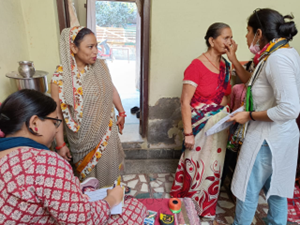
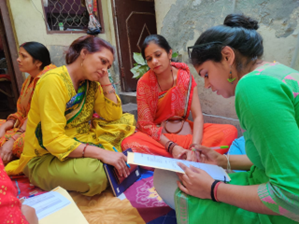
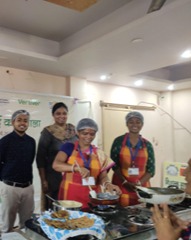
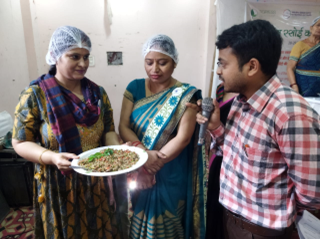

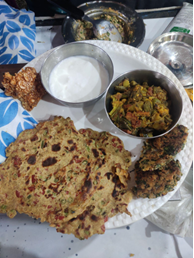



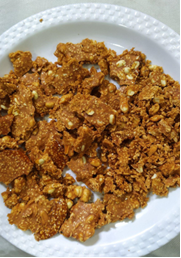






Comments